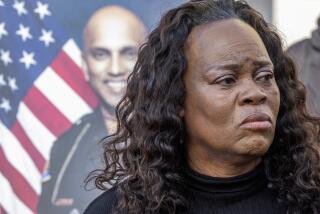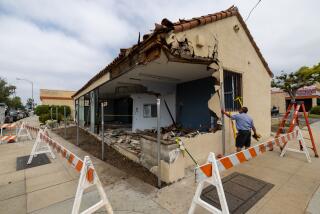Pasadena Attempts to Take Bullets Out of Youths’ Guns : Violence: Proposal would restrict ammunition sales. Some see novel approach as spawned out of desperation.
- Share via
Little did Gilda Martinez know, as she sat down to write “Twenty-five Things I Want to Do Before I Die,” that she would have less than four hours to do them.
Brimming with all the hope a high school freshman is entitled to, but tempered by her humble means, Martinez’s requests seemed markedly simple--to own a house, to be a grandparent--as if she had already learned not to ask, or hope, for too much.
Not long after she printed her name on her Valentine’s Day school essay, the Pasadena 16-year-old made her way to a party where she danced, gossiped and then was shot to death when caught in the middle of yet another fight between rival gangs.
Coming just two weeks before the Pasadena City Council was scheduled to take up the issue of youth violence, Martinez’s death may provide impetus for passage of a controversial, and apparently first-of-its-kind measure: a law to restrict the sale of bullets in Pasadena. The thinking behind the law: If you can’t keep guns away from teen-agers, then maybe you can prevent people from selling ammunition to them.
If, as expected, the seven-member City Council approves the law Monday night, the novel tactic will be added to a growing list of ways in which cities nationwide are attempting to treat the epidemic of youth violence. Midnight basketball, bans on certain kinds of clothing, dunning parents for crimes committed by their children--anything, it seems, is worth a try.
“We’ve got to find a way to break the spell,” said Theodore H. Jones of Pasadena’s Coalition for a Non-Violent City, a grass-roots organization that has been a principal backer of the restricted bullet sales proposal. The coalition formed in 1993 after the community grew incensed at the Halloween night slayings of three boys by gang members who mistook them for rivals. “This ordinance is not the answer, but it’s part of the answer,” Jones said.
*
The “registration of ammunition sales” law would require bullet buyers to provide identification and complete a registration form. The information, which would include how much ammunition the person bought and what caliber, would be maintained and monitored by police, much the way police treat pawnshop purchases.
It is needed, the law says, “to respond to the easy availability of ammunition.”
Since it is illegal for juveniles to purchase ammunition, the law’s requirement for an identification check is intended to prevent the underage from making purchases.
“Right now, nobody really checks; the norm is young people can get ammunition,” Pasadena Police Chief Jerry Oliver said. “If you’re 14 or 15 years old, you should not be able to stop, jump out of a car, run into a gun store and buy ammunition.”
The ability to know who bought a bullet also will help police solve crimes, law enforcement officials say, particularly those that are youth gang-related, where witnesses often are reluctant to come forward.
Before pursuing the law, the city sought an opinion from the state attorney general’s office to make sure it did not conflict with any superseding state laws.
Proponents compare the proposal to restrictions placed on glue sales in the 1970s to prevent glue-sniffing deaths among youngsters.
Critics of the measure--who include friends and associates of Martinez--say the law is largely symbolic, and that it hurts more than helps because it diverts attention from the root causes of the problems facing today’s youth.
“If we stop selling bullets in Pasadena, we’re going to go to Glendale to buy them,” said Oscar A. Palmer, director of alternative education for the Pasadena Unified School District and administrator of the continuation school Martinez attended. “Gilda was one of those kids who was going to pull herself up by her bootstraps. She earned three As and a B, and we don’t have a lot of students here that get three As and a B. Her death is a tragedy.
“But this ordinance is going to have little impact on preventing tragedies.”
A longtime resident of Pasadena, Palmer said: “We have neglected our youth for years. . . . We spend more time talking about the Super Bowl, the World Cup and economic development, and now, bullets, than we do kids.”
Others argue that the law would represent an unnecessary infringement on gun ownership rights--a position that makes Oliver bristle.
“We knew from the outset we were going to have those kinds of people,” Oliver said. “But those same people do not show up in the middle of the night when kids are shot and be outraged about that.”
Although the federal government had similar laws on the books until Congress repealed them in 1986, Pasadena’s proposal appears to be unique, officials say, at least among local communities.
“I think it’s a great idea,” said Jeffrey Butts, senior research associate for the Pittsburgh-based National Center for Juvenile Justice. “It seems like it would make sense and it avoids the whole 2nd Amendment (right to bear arms) issue.”
Jeff Muchnick, legislative director for the Coalition to Stop Handgun Violence in Washington, D.C., said the city’s proposal is unusual. On the other hand, Muchnick said, such novel approaches, spawned out of a gnawing sense of desperation, seem the order of the day for communities groping for a way to deal with soaring juvenile crime rates.
“Things are happening all over the country,” Muchnick said. “Over the last three years . . . there’s really been an explosion in violence among younger people, and I think it really has touched people.”
In Illinois, some cities have banned the sale of handguns, as has Washington, D.C.
Last year, Madison, Wis., prohibited the sale of “Saturday night specials,” cheap guns that often fall into the hands of young people, authorities say.
In Northern California’s Contra Costa County and in some communities in Southern California, officials have attempted to restrict the number of gun dealers by changing zoning laws.
*
Like Pasadena’s 16-month-old Coalition for a Non-Violent City, anti-violence groups continue to pop up on the political landscape: There’s Seattle-based Ceasefire, Boston’s Citizens for Safety and its Hands Without Guns public education program. In Montgomery County, Md., officials have launched the White Ribbon Program, in which they persuade youths to pledge in writing that they will not touch handguns.
When it comes to bullet regulation, recent efforts have mostly been carried out on the national level, experts say, and, so far, they have been unsuccessful.
U.S. Sen. Daniel Patrick Moynihan (D-N.Y.) has tried to ban the sale of bullets for Saturday night specials. Proposals to tax handgun ammunition at a rate of 50% in an effort to cut purchases have also fallen by the wayside in the wake of opposition by the gun lobby and its multibillion-dollar industry.
“There’s a lot more going on than there was just a couple of years ago,” said Muchnick from the Coalition to Stop Gun Violence.
Amid opposition and the emotional aftermath of a memorial service held this week for Martinez, it appears that Pasadena’s bullet sales law will pass, if narrowly, according to officials. Although the specter of an angry and vocal crowd could sway the voting, at least four council members appear to support the ordinance, two oppose it and one may be undecided.
Even proponents concede that the law is largely symbolic and will be of limited effectiveness because an ammunition buyer could bypass it by crossing city lines. But they say they hope the problem will be solved by other cities following suit.
“If Pasadena can take this step . . . then another community can, then another, then another,” said George Regas, rector at Pasadena’s All Saints Episcopal Church and a leader in the city’s nonviolence coalition.
Though Mayor Kathryn Nack favors the law, she does so more out of a sense of futility, she says, than a belief that it will work.
“I don’t know that anything will keep ammunition from getting in children’s hands,” she said. “But I’m in favor of anything, anything , that gives some hope. I talked to a 19-year-old young woman yesterday who happened to be where I was. She was upset . . . and I asked her what she was upset about, and she said, ‘I’m tired of going to memorials.’
“I am, too.”
(BEGIN TEXT OF INFOBOX / INFOGRAPHIC)
Bullet Proposal
Police hope the ammunition sales ordinance being considered by the Pasadena City Council will limit the ability of juveniles to purchase bullets for handguns. If passed, people who buy ammunition would have to sign a registration form that would include:
* Date of transaction
* Purchaser’s name, address and date of birth
* Purchaser’s driver’s license number or other form of identification
* Brand of ammunition purchased
* Type and amount of ammunition
More to Read
Sign up for Essential California
The most important California stories and recommendations in your inbox every morning.
You may occasionally receive promotional content from the Los Angeles Times.













